
Journal of the Korean Electrochemical Society
Scope & Guideline
Connecting Researchers to Shape Tomorrow's Electrochemical Solutions
Introduction
Aims and Scopes
- Electrochemical Energy Storage and Conversion:
This area encompasses research related to batteries, supercapacitors, and fuel cells, focusing on improving performance, cycle life, and energy density through innovative materials and designs. - Electrocatalysis and Reaction Mechanisms:
The journal emphasizes studies on electrocatalytic materials and their applications in energy conversion processes, particularly in water splitting and fuel cells, exploring the underlying reaction mechanisms. - Material Science for Electrochemical Applications:
Research on the development and characterization of novel materials, including nanostructures, composites, and solid electrolytes, that enhance electrochemical performance in various applications. - Electrochemical Sensors and Biosensors:
This scope includes the development of advanced electrochemical sensors for environmental monitoring and biomedical applications, highlighting the integration of electrochemical methods with nanotechnology. - Electrochemical Processes in Environmental Applications:
Investigations into the use of electrochemical technologies for treating pollutants, energy recovery, and sustainable practices in environmental management.
Trending and Emerging
- Advanced Lithium Battery Technologies:
Recent publications focus on improving the cycle performance and safety of lithium batteries, including the use of novel materials and structures, reflecting a growing need for high-performance energy storage solutions. - Green Hydrogen and Water Electrolysis:
The exploration of electrocatalysts for water splitting and the thermodynamics of hydrogen production is gaining traction, as these technologies are pivotal for the transition to sustainable energy systems. - Nanostructured Materials in Energy Applications:
There is an increasing emphasis on the fabrication and application of nanostructures in electrochemical devices, highlighting their potential to enhance efficiency and performance across various electrochemical systems. - Polymer Electrolytes and Solid-State Batteries:
Research on polymer electrolytes and solid-state battery technologies is emerging, driven by the demand for safer and more efficient battery systems with improved energy densities. - Bioelectrochemistry and Biosensors:
The integration of electrochemical techniques with biological systems for sensing applications is on the rise, indicating a trend towards interdisciplinary research that combines electrochemistry with life sciences.
Declining or Waning
- Traditional Battery Technologies:
Research on conventional lithium-ion battery technologies has become less prominent as the focus shifts towards new materials and battery architectures that promise higher energy densities and better performance. - Basic Electrochemical Theory:
Papers that delve into fundamental electrochemical theories and principles have decreased, possibly as researchers prioritize practical applications and innovative technologies over theoretical discussions. - Single-Use Electrochemical Cells:
There appears to be a waning interest in studies related to single-use or disposable electrochemical cells, as the emphasis moves towards rechargeable systems that align with sustainability and energy efficiency goals.
Similar Journals

International Journal of Electrochemical Science
Connecting scholars to foster innovation in electrochemistry.International Journal of Electrochemical Science is a peer-reviewed journal dedicated to disseminating cutting-edge research in the field of electrochemistry. Published by Elsevier in Serbia, this journal serves as a vital platform for scientists and researchers to explore innovative electrochemical techniques, processes, and applications. With an ISSN of 1452-3981, it has been a respected source of scholarly articles since its inception in 2006 and continues to bridge the gap between theoretical advancements and practical implementations up until 2024. Notably, it holds a Q4 quartile ranking in the field of electrochemistry and ranks 41 out of 60 in the Scopus database, situating it within the 32nd percentile among its peers. The journal champions open academic discourse, contributing significantly to the advancement of knowledge in electrochemical sciences, making it an essential resource for researchers, professionals, and students alike who are striving towards new discoveries and innovations.
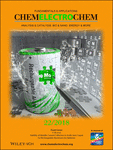
ChemElectroChem
Empowering global scholars with open-access insights.ChemElectroChem is a premier open-access journal published by WILEY-V C H VERLAG GMBH, focusing on the interdisciplinary fields of catalysis and electrochemistry. Established in 2014 and actively publishing until 2024, this journal boasts an impressive reputation, currently ranked in the Q2 category for both catalysis and electrochemistry according to the 2023 metrics. With an Scopus ranking placing it in the 74th percentile for Electrochemistry and 61st for Chemical Engineering and Catalysis, ChemElectroChem serves as an essential platform for researchers, professionals, and students dedicated to advancing knowledge and fostering innovation in these critical scientific domains. Since its transition to open access in 2023, the journal aims to maximize the dissemination of cutting-edge research and facilitate the exchange of ideas among global scholars, thereby enhancing the accessibility and impact of high-quality science within the community. For those engaged in the ever-evolving conversations around energy storage, conversion processes, and sustainable solutions, ChemElectroChem is an invaluable resource.

SURFACE ENGINEERING AND APPLIED ELECTROCHEMISTRY
Catalyzing Progress in Materials Science and EngineeringSURFACE ENGINEERING AND APPLIED ELECTROCHEMISTRY, published by PLEIADES PUBLISHING INC, stands as a pivotal resource in the realms of engineering and materials science. With an ISSN of 1068-3755 and an E-ISSN of 1934-8002, this journal encompasses an extensive scope that includes industrial applications, and innovative surface treatments, fostering advancements in the fields of Industrial and Manufacturing Engineering, Surfaces, Coatings and Films, and Surfaces and Interfaces. Recognized for its contributions, it currently holds a Q3 classification in both Industrial and Manufacturing Engineering and Surfaces, Coatings and Films, alongside a Q4 ranking in Surfaces and Interfaces for the year 2023. Despite its competitive standings, the journal encourages inclusive dialogue and dissemination of research from a global community—making it an essential platform for researchers and professionals dedicated to surface technologies and applied electrochemistry. Potential contributors and readers can expect a comprehensive exploration of techniques and innovations, reinforcing the journal's commitment to bridging theory and practical application in these dynamic fields.

Sensors and Actuators Reports
Connecting Ideas, Inspiring Discoveries in Modern ScienceSensors and Actuators Reports, published by Elsevier, is a premier open access journal that has been contributing to the fields of physics, computer science, and engineering since its establishment in 2019. With its ISSN 2666-0539, this journal has rapidly gained recognition, achieving Q1 quartile rankings across multiple categories, including Atomic and Molecular Physics, Computer Science, and Electrical Engineering. By providing a platform for high-quality research and innovative findings, Sensors and Actuators Reports is dedicated to advancing knowledge in sensor and actuator technologies, which are pivotal for numerous applications in modern science and industry. The journal's performance is underscored by its impressive Scopus rankings, placing it in the top tiers across various disciplines. Open access ensures that research is widely disseminated, fostering collaboration and enabling researchers, professionals, and students alike to engage with the latest advancements in their fields.

Journal of Electrochemical Science and Technology
Catalyzing Innovation in Electrochemical TechnologiesJournal of Electrochemical Science and Technology, with the ISSN 2093-8551, is a distinguished publication in the field of electrochemistry, disseminated by the Korean Electrochemistry Society. Based in South Korea, the journal has made significant strides since its inception in 2014, showcasing groundbreaking research that spans various applications of electrochemical science. Currently ranked in the Q2 category for Electrochemistry, it occupies an emerging position within the academic community, evidenced by its Scopus rank of #25 out of 60 in the Electrochemistry domain, placing it in the 59th percentile. Although the journal follows a traditional access model, it remains committed to providing high-quality, peer-reviewed content that fuels innovation and scholarly dialogue. With objectives firmly rooted in advancing the understanding and application of electrochemical phenomena, this journal serves as a crucial resource for researchers, professionals, and students alike, striving to push the boundaries of the electrochemical sciences.
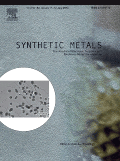
SYNTHETIC METALS
Transforming Ideas into Advanced Material Solutions.SYNTHETIC METALS is a leading academic journal published by Elsevier Science SA, focusing on the interdisciplinary field of materials science with an emphasis on the development and application of synthetic metallic materials. Established in 1979, this esteemed journal offers a platform for innovative research that promotes advancements in condensed matter physics, electronic materials, materials chemistry, and mechanical engineering. With an impressive Q1 ranking in Metals and Alloys and Q2 rankings across various other categories, SYNTHETIC METALS serves as a vital resource for researchers, professionals, and students seeking to explore complex material systems and their applications in industry. Although it does not currently offer open access, the journal's impact is highlighted by its robust Scopus rankings, ensuring high visibility and dissemination of meaningful research outcomes. As it progresses through its convergence period to 2024, SYNTHETIC METALS remains dedicated to advancing knowledge and fostering scientific inquiry in the field of materials science.

Electrochemical Science Advances
Empowering Scientists through Open Access InsightsElectrochemical Science Advances, published by WILEY, is an esteemed Open Access journal that has been making significant contributions to the field of electrochemistry since its inception in 2021. With an ISSN of 2698-5977, this journal serves as a vital platform for researchers and practitioners looking to disseminate their findings on a diverse range of topics within the electrochemical sciences and related areas. The journal has achieved commendable rankings in the Scopus database, placing it in the 2nd quartile in Chemistry (miscellaneous) and the 3rd quartile in Electrochemistry, highlighting its relevance and growing influence in the academic community. As it converges from 2021 to 2024, Electrochemical Science Advances aims to foster collaboration and innovation, offering a vital resource for students, professionals, and researchers dedicated to advancing knowledge and technology in electrochemistry. Access to this cutting-edge research is straightforward, allowing for a comprehensive engagement with the latest advances in the field.
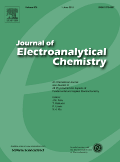
Journal of Electroanalytical Chemistry
Unveiling the Future of Electroanalytical ChemistryThe Journal of Electroanalytical Chemistry, published by Elsevier Science SA, stands as a leading platform for the dissemination of cutting-edge research in the field of electroanalytical science. With an impressive impact factor that reflects its esteemed reputation—ranking in the Q1 category for both Analytical Chemistry and Chemical Engineering, alongside a strong presence in Electrochemistry—this journal provides a vital resource for researchers, professionals, and students alike. Covering topics from fundamental electrochemical processes to innovative analytical techniques, the journal aims to foster an in-depth understanding and discussion of contemporary advancements in electroanalytical methodologies. Operating under a model that prioritizes quality and rigor, it facilitates access to high-quality manuscripts and reviews that contribute to the advancement of the field. For over six decades, from 1959 to 2024, it has played an intrinsic role in shaping the landscape of electrochemistry, continually driving forward the frontiers of knowledge and application.
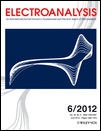
ELECTROANALYSIS
Bridging Theory and Application in Electrochemical ResearchELECTROANALYSIS is a premier journal published by WILEY-V C H VERLAG GMBH that serves the dynamic field of analytical and electrochemistry. Established in 1989, this scholarly publication has successfully converged its focus to cover a wide array of topics including novel electrochemical methods, sensor technology, and environmental analysis, reflecting the latest advancements and trends in the field. With an impressive 2023 impact factor that places it in the Q2 quartile of Analytical Chemistry and Q3 quartile in Electrochemistry, the journal is recognized for its high-quality research and contributions. Its Scopus rankings further reinforce its credibility, standing at #46/156 in Analytical Chemistry and #26/60 in Electrochemistry. Although currently not offering Open Access, the journal remains a significant resource for researchers, professionals, and students keen to stay at the forefront of electroanalytical techniques. With a global readership, ELECTROANALYSIS continues to drive knowledge and innovation within the scientific community.
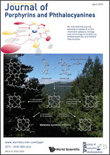
JOURNAL OF PORPHYRINS AND PHTHALOCYANINES
Innovative Research in Chemistry and Materials ScienceJOURNAL OF PORPHYRINS AND PHTHALOCYANINES, published by WORLD SCIENTIFIC PUBL CO PTE LTD, is an influential peer-reviewed journal dedicated to advancing the field of porphyrins and phthalocyanines, key compounds in both chemistry and materials science. With an ISSN of 1088-4246 and an E-ISSN of 1099-1409, this journal has been a vital resource since its inception in 1997 and is expected to continue until 2024. The journal holds a respectable position in the academic landscape, categorized in the Q3 quartile for miscellaneous Chemistry journals and ranked #252 out of 408 in the general chemistry category according to Scopus, reflecting a growing impact in the field despite its current percentile standing at 38th. JOURNAL OF PORPHYRINS AND PHTHALOCYANINES seeks to publish original research articles, reviews, and critical studies that explore the synthesis, characterization, and applications of these versatile compounds, which play essential roles in numerous scientific disciplines, from catalysis to materials development. This journal is an indispensable platform for researchers and professionals seeking to disseminate their findings, engage with contemporary discussions, and stay informed about cutting-edge advancements in porphyrin and phthalocyanine research.